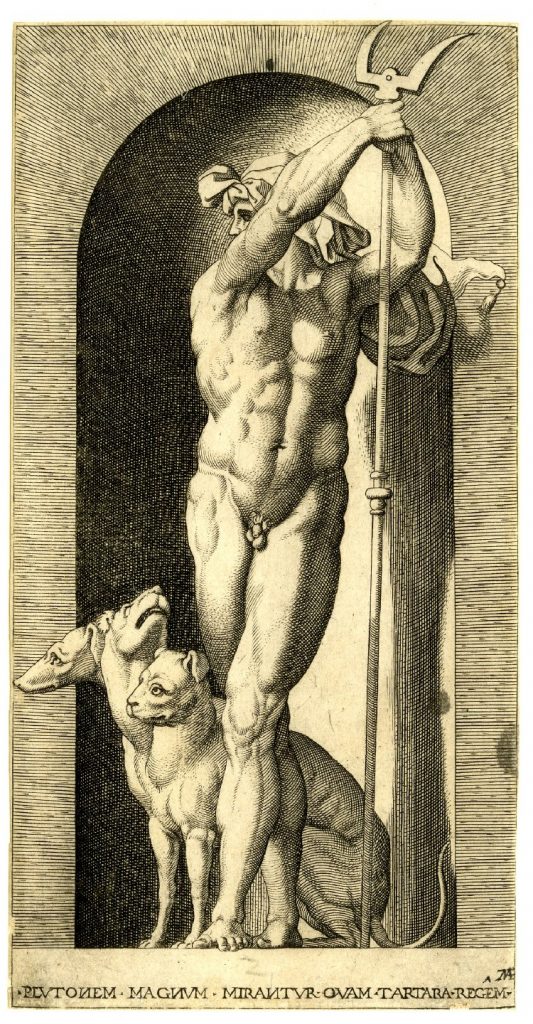More often than not, ancient Greek mythology (religion) served to explain a series of legends. Different from modern religions such as Christianity, Judaism, or Islam, ancient Greek religion was an anthropomorphic polytheism, meaning that ancient Greeks believed in a multitude of individual divine figures that took on human forms and emotions.1 Furthermore, ancient Greek mythology lacked much of the asceticism and mystical enthusiasm that is more commonly seen in modern religions. Most of the highly developed anthropomorphic and comparative rationalism of the ancient Greek religious thought can be accredited to Homer with the aid of his Iliad and Odyssey.2
The people of the ancient Greek civilization were often in a state of weakness under the power of nature; therefore, they relied heavily on the divine individuals of Olympus. Why? They believed that the forces of nature were under the control of their gods. In short, the relationship between humans and divine beings was that of a retribution justice.3 If humans did anything to offend the gods, then those gods would strike back in some sort of fashion to restore justice.4 Therefore, humans were constantly looking to please the gods in fear of their wrath.
Out of the ancient Greek mythology came the god of the dead and the underworld, Hades. Hades had five other siblings: Zeus, Poseidon, Demeter, Hera, and Hestia, and they were all children of Cronus and Rhea.5 After defeating their parents (the Titans), Hades drew lots with Zeus and Poseidon to gain their respective domains. Hades was commonly thought to be a cold god, but he was never considered to be an evil divine figure. Furthermore, it is important to note that his realm, the underworld, should not be associated with the hell of Christianity.6 However, Hades was for the most part feared by all. Another name for the ancient Greek god was Ploutos and later adopted by the Romans as Pluto.7

The god of the underworld was the husband of Persephone (Zeus’s and Demeter’s daughter). Although she was Hades’ wife, she only lived with him during the winter time.8 Persephone was the divine goddess of agriculture and fertility. Therefore, the ancient Greeks accredited the change in nature (winter) to Persephone moving to the underworld. Persephone was unable to stay with Hades at all times due to interference from her mother Demeter. Zeus, however, was okay with the marriage of Hades and Persephone. Therefore, in order to set up the marriage, Zeus had to trick Persephone, so she could be abducted by Hades.9 However, Demeter interfered, and that is why Persephone spends half of the year with Demeter and the other half with Hades.
Furthermore, it is important to note the Greek perspective of the afterlife. Perspectives about the afterlife varied from each other based on their region in Greece as well as their time period in Greek history. The consensus was that the underworld was neither heaven nor hell.10 The sense that exists within Christianity, for example, was not present during the time of the ancient Greeks. Although Tartarus was present as a location within the underworld, the Greeks would not compare it to the equivalent of Christian hell. The way the Greeks saw it, the underworld was a place that everyone ended up after death.11 However, there were a few, including the philosopher Epicurus, that believed that the underworld did not exist at all. He believed that when the body died, the soul died with the body as well.12 A good portion of Greeks refused to believe such a pessimistic perspective of the afterlife. However, even the Greek traditional perspective of the underworld was not as popular despite many Greeks believing in it.
- Funk & Wagnalls New World Encyclopedia, 2016 s.v., “Greek Religion and Mythology.” ↵
- Funk & Wagnalls New World Encyclopedia, 2016 s.v., “Greek Religion and Mythology.” ↵
- Funk & Wagnalls New World Encyclopedia, 2016 s.v., “Greek Religion and Mythology.” ↵
- Funk & Wagnalls New World Encyclopedia, 2016 s.v., “Greek Religion and Mythology.” ↵
- Salem Press Encyclopedia, January, 2015, “Hades (deity),” by Joseph, Michael, DMin. ↵
- Salem Press Encyclopedia, January, 2015, “Hades (deity),” by Joseph, Michael, DMin. ↵
- Salem Press Encyclopedia, January, 2015, “Hades (deity),” by Joseph, Michael, DMin. ↵
- Salem Press Encyclopedia, January, 2015, “Hades (deity),” by Joseph, Michael, DMin. ↵
- Salem Press Encyclopedia, January, 2015, “Hades (deity),” by Joseph, Michael, DMin. ↵
- The Greenhaven Encyclopedia of Ancient Greece, 2007, s.v. “Underworld,” by Robert B. Kebric. ↵
- The Greenhaven Encyclopedia of Ancient Greece, 2007, s.v. “Underworld,” by Robert B. Kebric. ↵
- The Greenhaven Encyclopedia of Ancient Greece, 2007, s.v. “Underworld,” by Robert B. Kebric. ↵



186 comments
Diego Aguilera
I really enjoyed this article and the back story it provided with information about
Hades. It described how he is the god of the underworld but it shouldn’t be perceived as “hell”. That is something i didn’t know and i thought it was. I like the information it gives about his marriage and how strict the rules can be defending on your role. To read that these gods were worshipped so they weren’t strikes back upon is crazy to think about. Overall this article is great.
Eric Ortega Rodriguez
Wow, this article was extremely fascinating. Especially due to the fact that I have never looked into Greek mythology. I found it interesting that the Greeks had a god for almost everything, surprisingly even for agriculture and fertility. I also found it interesting that the belief of an underworld was just a place everyone would go, which I had never looked at from that perspective. Overall, a very well-written article with a good topic selection.
Sebastian Carnero
Greek mythology is fascinating. I didn’t know Persephone was Hades wife nor that she was the god of fertility. The idea of Persephone being in the underworld is a very interesting interpretation of winter. The sole location of Gods could alter many aspects of nature. The ideas Greeks had of afterlife also brought my attention. They were pretty diverse and they didn’t show fear of the afterlife or going to the underworld. The underworld was just a place where you end up.
William Rittenhouse
It’s interesting how common of a misconception it is how people think Hades was like Hell. They came before the time of Christianity and the only other thing closely related to Christianity was Judaism. Greek philosophers really were the ones that set the tone for moralistic thinking. Now, we still use some of these ancient moralistic ideals that great thinkers such as Plato and Aristotle introduced into the Greek society. Plato was condemned to death for a false accusation for corrupting the youth when really he was introducing better means for thinking about why are we here and how should we act.
Cooper Dubrule
The way that this article is not only informational about mythology but even goes into why the people of the time believed in what they did is really what brings this article together. I like they way that it clears up misconceptions that many people have when it comes to Greek mythology. For example, I had always attributed Hades and the underworld to hell and the devil however this article explains there is a different divinity to Hades.
Esperanza Rojas
My favorite Greek god had to be Hades but even then, this article gave me more information than I knew. For instance, the fact that they Greek religion was anthropomorphic polytheistic, which I didn’t know there was a difference from just being a polytheistic religion, but I did find it interesting that the Greek gods were the ones that take human forms and have “human” emotions. I also didn’t know that Hades was not perceived as evil but more rather “cold” and “distant”. I always assumed that because he ruled the underworld, which I also thought was a Greek hell, he was bitter and vengeful.
Luisa Ortiz
When I hear the word underworld I immediately pare it up with hell, because of what I haven thought since little! it is so cool learning about other cultures and culture’s beliefs, This article is really cool and informative, I heard about Hades before but I never knew about his second name” Pluto” also I never would thought he had a wife! I like how the author gives us the story of Hade’s wife Persephone.
Alexander Manibusan
If the traditional view was not that poplar then what did the majority of Greeks believe about the underworld? Did they just simply believe that there was some spiritual realm where everyone goes after they die? Aside from that, I wish the article had more information about Hades. It would have been nice to know exactly how Hades became the ruler of the underworld and to see how he influenced the society of the Greeks.
Megan Copeland
I remember learning about Greek mythology when I was younger and I was always so fascinated by it. Every time I would hear “Hades” I would picture him to resemble the devil or for them to be the same person. It was interesting to read that the underworld is not related to the Christianity version of hell. This was a well written article, because it presented facts that gave us more knowledge about Hades and the underworld.
Antoinette Johnson
I think that most of the time when, people think of the different aspects of Greek mythology they compare it to religions like Christianity. I thought that Hades underworld was the same as hell from Christianity. This article clarified the difference between the two and I learned that it also depends on a person’s perception about the particular place. In Christianity, hell is deemed as a bad place that no one wants to go so when we think of Hades we project this view on to it. The Greeks at the time just though it’s a place where all the dead go. This separates the different viewpoints.